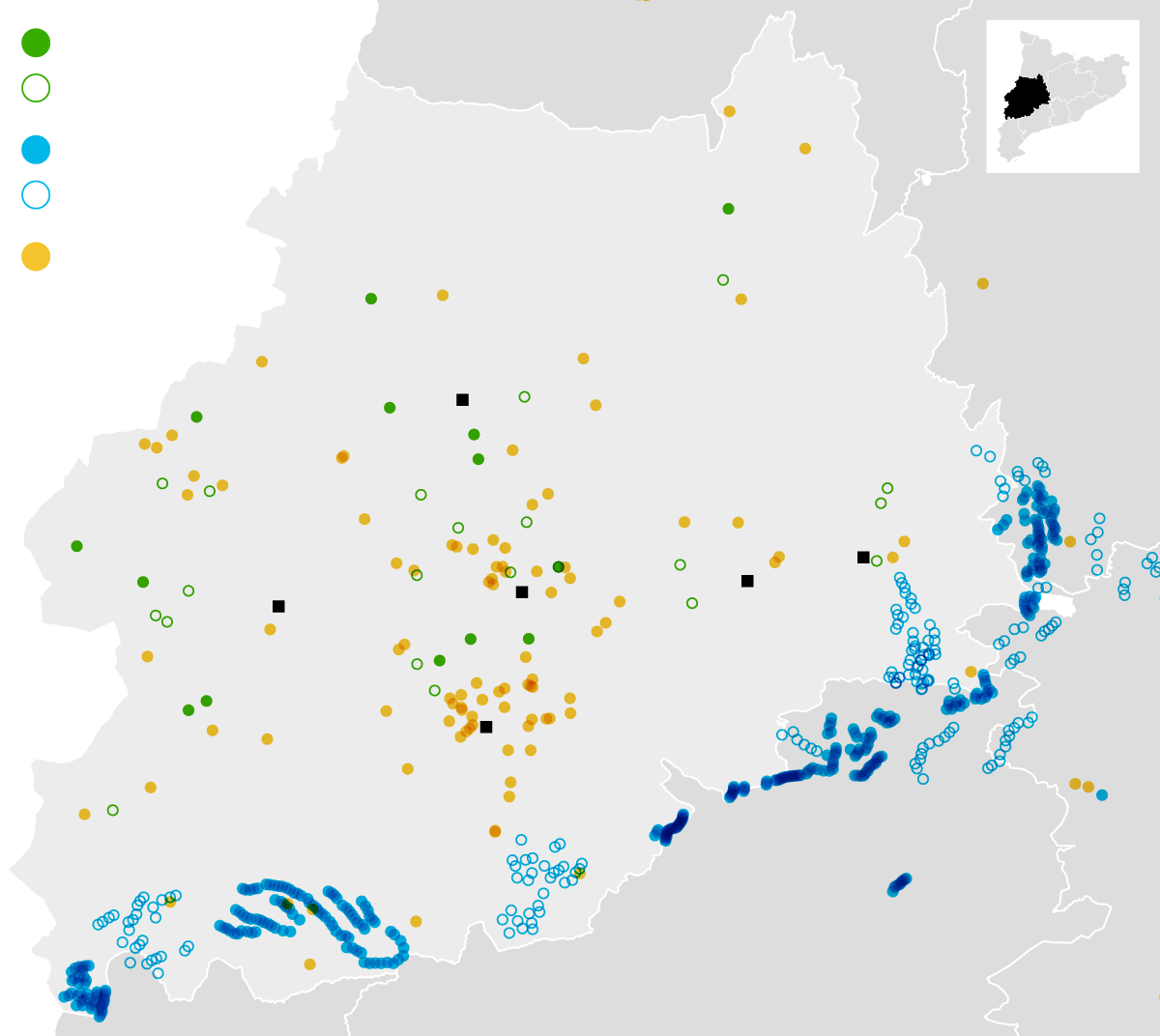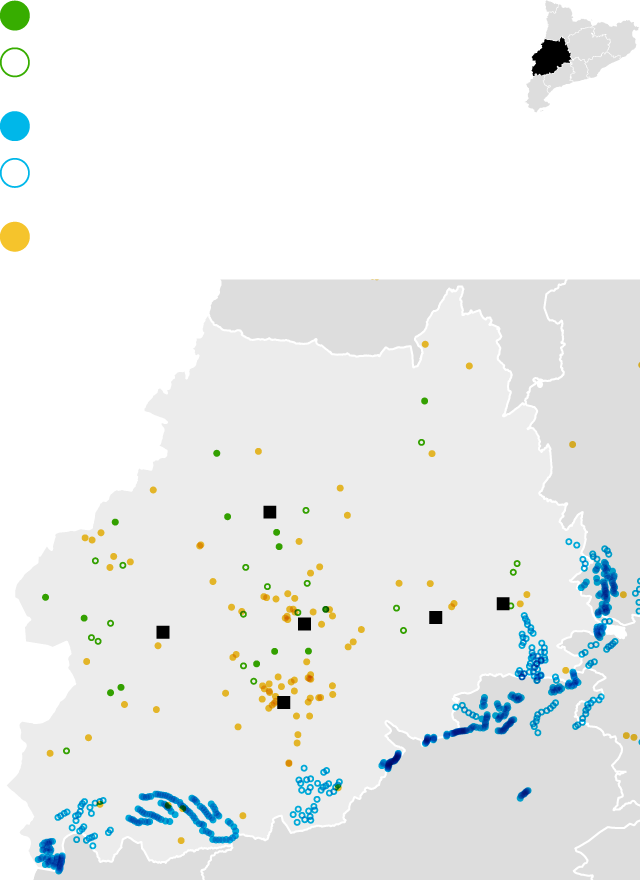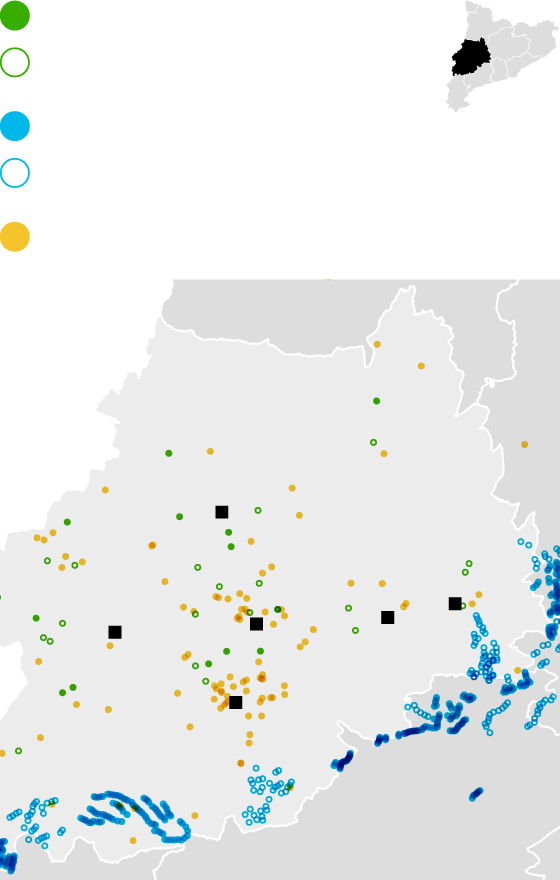A train wreck for energy projects in the rural world
A segment of civil society in Ponent is mobilizing against it, while the promoters are campaigning in favor.


LleidaMore than a thousand people, most of them linked to more than 150 civic organizations from different Catalan regionsOn October 5th, they staged a massive show of force through the streets of Lleida. They were organized by sixteen entities, including the Assemblea Pagesa de Catalunya (Catalan Farmers' Assembly). the Pueblos Vivos platformThe environmental group Ipcena and SOS Vall del Corb all took to the streets under a common slogan: "We defend the land." What did they mean by this? They explain it themselves. "We want a new rurality, one that isn't dependent on urbanism and territorial imbalance," says Víctor Altés, an agricultural engineer and member of Pobles Vius. The activists warn that the rural world is under attack. "When we say attack, we're referring to all these large-scale energy projects that have nothing to do with the needs of the land, but rather with a colonization of rural areas without even consulting the people who live there," Altés argues. The protesters lament that large companies and investment groups are assaulting rural areas surreptitiously and maliciously.
"We must stop it before it's too late. Rural areas are destined to be a vital space for life in the near future, where the ecological and resource crisis will force the relocation of the economy and relationships, and it makes no sense to continue along the paths of an increasingly obsolete and adrift socio-economic system," they declared.
For this reason, one of the demands of the October 5th protesters was to request a moratorium on the implementation of energy projects until a plan agreed upon with local stakeholders is available, and the repeal of Decree Law 12/2025, "which subordinates rural areas and their economies to the interests of developers." Geographer and political activist Sergi Saladié asserts that "municipalities have been forced to develop their own urban planning for renewable energy, because if they don't, companies will end up doing whatever they want and the Generalitat (Catalan government) will authorize it without any repercussions." In any case, Saladié argues that the shift from fossil fuel and nuclear technologies to renewables must also be accompanied by a change from a centralized model of a few power plants and large corporations to a distributed one, with multiple producers, local communities, and small facilities that take advantage of altered spaces.
"We're rowing in the wrong direction," warns Vanessa Freixa, an activist from Pallars. "Many people are considering selling their land in the face of a massive land grab, in which large corporations will ultimately control the foundation of what should be our food for our very survival," Freixa concludes.
The onslaught they're referring to translates into a significant list of projects, such as the installation of more photovoltaic plants and wind turbines in the Corb valley, big high voltage power lines in l'Horta de Lleida and in the regions covered by the plan, the future waste gasification plant for slurry management in Juneda, the expansion of the composting plant in Torregrossa and new biogas plants in municipalities such as Tarroja and La Sentiu de Sió, among others.
The protesters' demands appear to partially clash with the Catalan government's aims, as outlined in its Catalan Biogas Strategy 2024-2030 and its corresponding action plan, which seeks to achieve climate neutrality by 2050. The plan aims to promote the valorization of biogas and its use for generating heat, electricity, biomethane, and biofertilizers. This translates into subsidizing private projects that will enable the achievement of the 2030 targets of managing 8.5 million tons of organic materials (three times more than currently) to triple primary energy production from biogas (up to 2 terawatt-hours per year). The Catalan government's plan literally argues that "rural areas are key to developing biogas, since this energy source relies on raw materials, including those generated by the primary sector, as well as the agri-food industry, the organic fraction of municipal waste, sewage sludge, and other waste." It also defends its implementation in the name of "preventing depopulation and the brain drain from rural areas." "Subsidizing these plants means we are now experiencing the third major bubble," warns Laura Calvet Mir, PhD in environmental sciences; "before it was renewables, and now it's biogas." The environmental scientist laments that this is reaching a point of political ecology, a process in which large companies from outside the region are entering "and profiting from the business." "Under the guise of this being a common good, that we're going to fight climate change and that jobs will be created for everyone, they're selling us a bill of goods to ultimately guarantee a private business and, in the end, a territorial conflict," concludes Calvet Mir.
"We hope that, from now on, the Catalan government will tone down its arrogance, carefully consider its actions, and halt the construction," declare spokespeople for Pueblos Vivos (Living Villages). "They were wrong to put our land, our villages, our lives, and our future at the service of this spectrum."
Gerard Batalla, a member of the platform, urges a "rethinking of rural life so that we can enjoy the land and not be subject to the whims of capital that comes to conduct its speculative business." Laura Broto, from SOS Vall del Corb, asserts: "We will join forces with the local people, few in number, but we will fight to ensure that all our projects are valued, because those we have in rural areas are indeed sustainable." Rosa Pedrol, from Fem Semilla de Torregrossa, demands: "We don't want to be Catalonia's dumping ground."
'Money laundering' operation
The mobilization of civil society has been met in recent weeks by a handful of public events organized by the companies promoting these projects to explain their merits. The Juneda Livestock Cooperative (GAP) has been particularly persistent in this regard, presenting a new study that validated the benefits of its project while simultaneously beginning construction on its gasification plant. An independent study prepared by ERF-WATTEGA on behalf of GAP Cooperativa The report concludes that the Nova Tracjusa project in Juneda "meets all environmental and public health requirements, in addition to confirming the good air quality in Les Garrigues." Project managers argue that the elimination of cogeneration subsidies has forced the project's promoters (led by GAP Cooperativa and developed in partnership with Grup Griñó) to seek an alternative model, in this case, the gasification of fuels derived from waste (FRD), "a technology widely proven internationally and with lower emissions than the natural gas model used until now," they say. The Griñó Group, recently embroiled in a police operation for possible international illegal waste trafficking, made headlines for a completely different reason: sponsoring Àngela Mora, an athlete from Lleida and the first athlete with Down syndrome to compete in the International Games (October 10-12). Griñó announced that he would cover all the athlete's competition costs for a year, in addition to providing equipment for the rest of the athletes at Club Gimnàstic FEDAC-Lleida. Quite a gift.
Also The promoters of the Sentiu de Sió biogas plant project held their celebrationSeveral hundred livestock farmers gathered on October 17th at the municipal pavilion to "show their support for the plant," they said. Joan Batalla, president of Sedigas, and Salvador Salat, a member of the current board of directors of the Bioenergy Cluster of Catalonia, participated in an event that championed the benefits of the plant: "It will transform some 500,000 tons of green and sustainable raw materials (organic waste) such as pig slurry, cow manure, slaughterhouse waste, and other non-hazardous industrial organic waste from local companies, for the production of green gas (biomethane), which will be injected into the existing natural gas network." The promoters claim that more than 350 local livestock farmers have formally joined their project.
"We need the bio-industrial parks"
The G-10 is a strategic committee Born five years ago and formed by the main administrations, chambers of commerce, the University of Lleida and employers' and trade union organizations with a shared agenda for economic transformation based on the green and circular economyOne of the people who conceived the initiative is Teresa Botargues, an economic development advisor for the Lleida Provincial Council, who champions the potential of rural areas to lead strategic projects such as the creation of so-called bio-industrial parks, "territorially defined areas with their own urban planning instruments, intended for the orderly implementation of economic activities linked to the production of new foods." Currently, three are planned in the Ponent region (in Alcarràs, Montoliu de Lleida, and Balaguer). "We're not thinking about waste management plants, but rather bio-industrial activities that must be located close to the source of raw materials, that generate skilled jobs, and that have a high technological and knowledge component," argues Botargues. "We need bio-industrial parks to be industrial environments—not necessarily small—where bioeconomic activities take place, among which biogas production is also potentially included." Botargues recalls that the G-10 shared agenda has a governance model and an innovation ecosystem that promote the participation of all stakeholders in evaluating all proposed projects. "A couple of years ago," the technician remembers, "we organized an innovation workshop in Lleida to discuss bio-industrial parks, which was attended by over a hundred people. Environmental groups were invited, but none of them came." According to official sources, the latest minutes of the Lleida Urban Planning Commission, which evaluates biogas plant projects, list twelve projects under consideration. "If we add up the total organic matter that these twelve facilities expect to consume, it doesn't even reach thirty percent of all the organic resources available for biogas production, including the slurry we generate in the Lleida region; therefore, they are neither large-scale nor should we be receiving waste from elsewhere." to have a minimum dimension that is defined by the volume of the resulting product, that is, renewable gas, and not by the volume of raw material consumed."



